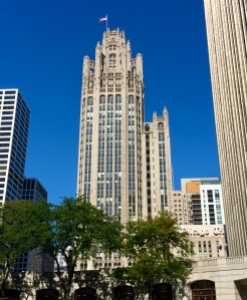
Just before Thanksgiving last year, Melissa Milios Davis was contacted by Jerry Healey, the co-owner — along with his wife, Ann Healey — of Colorado Community Media, which publishes 24 weekly and monthly newspapers in the Denver suburbs.
The Healeys were approaching retirement and looking to sell, and they were hoping to avoid turning over their life’s work to a corporate chain owner or a hedge fund. Milios Davis, vice president for strategic communications and informed communities at the Gates Family Foundation, serves on the executive committee of the Colorado Media Project, which has been seeking ways forward for local news since 2018.
That encounter, Milios Davis said at a recent webinar (you can watch it here; background information here), led to the sale last month of the Healeys’ newspapers to a new entity whose majority owner will be The Colorado Sun, a startup digital news operation that’s run as a public benefit corporation. That means the 24 papers, like the Sun, will not be organized to enrich its owners; any profits they earn will be rolled back into news coverage and other operations.
“These are still profit-making enterprises. It’s a business,” said Milios Davis, adding it would have been a “huge loss” if the papers had fallen into the wrong hands.
Also speaking at the webinar, organized by the Media Enterprise Design Lab at the University of Colorado Boulder, were Lillian Ruiz, co-founder and managing director of the National Trust for Local News, and Larry Ryckman, editor and co-founder of the Sun. The moderator was Nathan Schneider, an assistant professor of media studies at the university.
According a recent article about the deal by Corey Hutchins of Colorado College, the papers will be owned by the newly formed Colorado News Conservancy, which in turn is co-owned by the National Trust for Local News and the Sun. Hutchins reported that the 40 employees who worked for the Healeys, about half of them journalists, would keep their jobs.
The conservancy is currently seeking a publisher, Ruiz said at the webinar, and has invested a considerable amount of attention in the process. “We didn’t want to create just a replication of who have we had some handshakes with over a highball,” she said.
The Sun itself, which was founded after the meltdown of The Denver Post under the ownership of the hedge fund Alden Global Capital, is continuing to grow, said Ryckman — from a staff of about 10 when I wrote about the Sun for the Nieman Journalism Lab last fall to 15 today, with more on the way. He described the chance to save the community newspapers as something that was too important to pass up.
“At least on the Sun side, this came together pretty quickly,” he said. “This absolutely was a cause that was near and dear to our hearts…. We know who’s first in line when it comes to buying newspapers these days, and no one wants to see that happen.”
What helped jump-start the deal, said Milios Davis, was a study that the Colorado Media Project conducted several years ago in partnership with the Colorado Press Association. Among the findings: the number of journalists covering local news had been cut in half over the previous decade, in line with what was taking place nationally; and that of 151 newspapers they could identify, 93 were still locally owned.
“We saw on the horizon that a lot of these were … older owners” who lacked a succession plan, she said, explaining that there were 44 in that category. “We were looking at this as a tidal wave that would slowly crash on the shores,” which led to conversations about how to help them transition to new local ownership.
And then the Healeys came along.
One of the most important takeaways from what is happening in Colorado is that local news can still be run on a sustainable basis, and that corporate control and the gutting of newsrooms are not inevitable. As I wrote a few weeks ago, I would love to see the Colorado story replicated across the country. Ruiz said the exact model being used in Colorado might be unique to that area. But she added that her organization is looking at what might work in other parts of the country — especially in communities of color.
So how do we wrest control of local news away from chain owners? Report for America co-founder Steven Waldman, who’s been everywhere lately (it also turns out that he’s a co-founder of Ruiz’s organization), wrote an op-ed piece for the Los Angeles Times calling for tax breaks for newspaper owners who sell to nonprofits or public benefit corporations.
That would provide an incentive for the likes of Alden and Gannett to take their money and go home. I would add another incentive: tax penalties to be imposed on for-profit owners of newspaper chains of a certain size that are not owned locally.
Communities deserve a chance to take charge of their news and information. Three years after Alden all but destroyed The Denver Post, we’re starting to see a renaissance fueled by a new media venture and an old one that’s been given new life.

